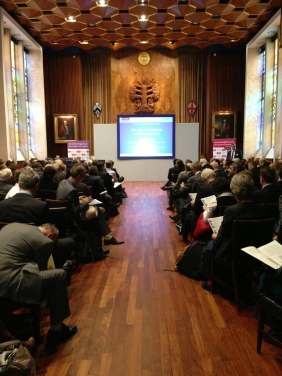Earlier this week, I attended “The City & Capitalism for the Long-Term” – an event in the Tomorrow’ Value Lecture series organized by the think tank Tomorrow’s Company.
The introduction was given by Lady Barbara Judge (Chairman, Pension Protection Fund) who was Commissioner of the US Securities and Exchange Commission in the 1980ies, when quarterly reporting was introduced with the goal of achieving higher levels of transparency in business. She pointed out that it was to her surprise that Europe followed suit, although it didn’t have to adopt the same short term reporting time frames. However, she suggests it is not too late to rethink these established principles.
Adapting longer time frames for companies’ investment and evaluation is also a main recommendation in the keynote presentation given by Dominic Barton, Global Managing Director at McKinsey & Company. He emphasized that there’s a crisis in capitalism by highlighting a number of powerful trends and statistics regarding the increasing pace of technological change, population growth and shifting demographics, rising inequality and youth unemployment, resource constraints and declining trust in business.
Dominic Barton recommends 3 areas for reform, which he also explained in his HBR article:

- To serve stakeholders, not only shareholders
- Support owner-based governance – aim for board members to feel a stronger sense of ownership and be more engaged in strategic planning rather than feduciary duties
- Shift from quarterly to longer-term reporting time frames by reviewing incentive structures and adapting regulation
Also part of the panel were Katherine Garret-Cox (CEO of Alliance Trust) and Mark Preston (Group Chief Executive of Grosvenor) who gave insights into their organizations’ approach to long-termism in their respective 125 and 300-year long company history.
Lastly, Fiona Woolf (Energy Consultant at CMS Cameron McKenna) shared her insights gained from working with business, government and the World Bank in the energy sector, and warns of a looming energy crisis. For Fiona Woolf, sustainability is a method of careful decision-making that will focus on long-term outcomes and “VUCA” readiness (volatility, uncertainty, complexity and ambiguity).
To sum up, it was an insightful evening with powerful messages from renowned figures in the City as well as globally providing a valuable contribution to the debate around how business values can be redefined for a sustainable future.
